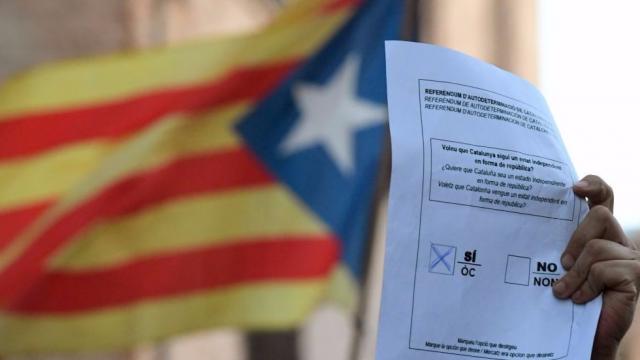
Joan Ramon Resina
On Tuesday, following a referendum held a week before in the face of brutal repression by Spanish police especially deployed for the occasion, Catalonia’s president Carles Puigdemont issued a declaration of independence. Unexpectedly, though, he immediately suspended its application, giving the Spanish government one last opportunity for negotiation. Puigdemont was clearly bowing to the last minute plea by Donald Tusk, president of the European Counsel, not to take an irreversible step that could block any negotiations.
On Wednesday, however, Spain’s Prime Minister Mariano Rajoy asserted that there was nothing to negotiate, threatening to activate Article 155 of the Spanish Constitution. If triggered, this provision would elicit Madrid’s complete takeover of the Catalan government. Article 116, the declaration of the state of exception, was also on the table.
Both would be extreme responses to the peaceful albeit, on Spanish terms, illegal exercise of democracy’s core belief: the people’s right to vote. In this instance, a vote based on the right of self-determination, which is protected in the United Nations Charter and the InternationalCovenant on Civil and Political Rights, of which Spain is a signatory, is a right of “all peoples.”
The bone of contention is, of course, whether Catalans are “a people.” But, as German President Frank Walter Steinmeier said on Monday, knowing the history of Catalonia is of the essence to adjudge its conflict with Spain. Catalonia has long considered itself a nation within a hostile state. The history of its self-government has been repeatedly disrupted through acts of war and dictatorships imposed by central Spain. This time, full scale military intervention is unlikely because the laws of the European Union preclude member states from turning their armies against their own populations.
Even so, militarized police was used against Catalan voters during the independence referendum on Oct. 1, and by supporting Rajoy’s reaction, the European Union has sent a signal that the Spanish premier interprets as a blank check. A democratic solution in the way of the United Kingdom’s Scottish referendum or Canada’s twice-held referendum by the Quebec is unthinkable for Spain’s main parties, both deeply marked by the authoritarian and centralizing ideology of the dictatorship of Francisco Franco.
In its unwillingness to protect a population that was always pro-Europe, the European Union may have fatally undermined its already shaky legitimacy. Leading states like Germany and France draw inappropriate parallelisms fearing regional unrest inside their own borders. But they may have less avowable reasons to support Spain’s hegemony in Catalonia at any price.
Catalonia’s contribution to the European Union between 2007 and 2011 was an annual 1.36 billion euros, or 0.69 percent of its gross domestic product, while Germany contributed 0.42 percent and France 0.40 percent. In the same period, Spain was a recipient of European funds equivalent to 0.21 percent of its gross domestic product. In the face of Spain’s massive deficit, the conservative rulers of the European Union are disinclined to alter a situation where Catalans foot the bill that, in the event of secession, would have to be redistributed more equitably.
The United States was the first government to recognize Franco’s regime after World War II, and it maintains various forms of cooperation with Spain, including a strategic military presence. The United States has no incentive to rock that relationship, but it has enormous leverage, which in the past it has used at various times, as it did to ensure Spain’s decolonization of the Western Sahara in 1975, to reverse Spain’s decision to opt out of NATO in 1982, and to enroll Spain in the 2003 Iraq war.
The United States could again use its influence to prevent a violent crackdown on defenseless Catalans and even to sponsor a negotiation between the parts that takes its cue not from a restrictive constitution interpreted by a partisan set of government-appointed judges, but from respect for the will of Catalans and their recognition as political subjects.
In its political DNA, the United States encoded long ago a declaration of independence against an oppressive legality. Our constitution enshrines the belief that all men are entitled to the pursuit of happiness, which must be understood to include the protection of their political rights. The fathers of the American Constitution considered these principles to be based on reason and hence to be more permanent than the accidental lines circumscribing the power of states on the world’s political map.
Joan Ramon Resina is a professor of Iberian culture and director of the Iberian Studies Program at the Europe Center of the Freeman Spogli Institute for International Studies at Stanford University.











